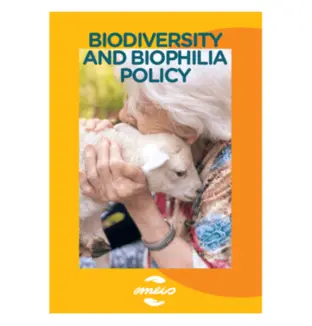"Nature is in our nature”
On May 22d, the world celebrates biodiversity. To talk about its place in care at emeis, we interviewed Muriel Barnéoud, the Group's Quality and CSR Director. She tells us what we know about the importance of nature in the care process, the role it plays for those we care for and their loved ones, but also, of course, in preserving the environment.
You wouldn't expect emeis, a player in the healthcare sector, to address the issue of biodiversity. And yet, it's at the heart of our approach. Could you tell us more?
Muriel Barnéoud:It's true, you might not expect a care group like emeis to take a stand on biodiversity. And yet... nature is very much part of who we are!
Because, yes, nature also heals. It plays an integral part in our health - physical, mental and social. It connects us to what is essential, to what breathes, evolves and transforms.
Our facilities are first and foremost places to live. We care, we support, we work, we "make society" together, with our strengths and weaknesses. And in each of these roles, the presence of the living around us makes all the difference.
When we think of biodiversity, we often think of something far away, of great forests and rare species. But first and foremost, it's there, every day, in our parks, gardens and flower-filled terraces. In France, for example, 93% of our establishments have a garden, park or planted outdoor space, and 100% of our establishments have terraces or landscaped outdoor areas. In the Netherlands, as in Austria and Ireland, all our nursing homes have planted areas and, in general, at least two-thirds of our facilities offer green spaces. These are not mere decorations. They are places to soothe, recharge and connect - for residents, patients, families... but also for the professionals who work there every day.
Promoting biodiversity means taking care of people and the land in a very concrete way. We plant locally, we nurture the living world by using local companies that facilitate professional reintegration, and we create spaces that feel good. It's our way of having a positive impact - on the planet, but also on the quality of life and work in our establishments.
Because that's what caring is all about: anchoring yourself in a living environment and making sure it stays that way.
For the planet, that's undeniable. You've renamed biodiversity "Nature and Health". Is this also an issue for medical care?
M. B.:Yes, for the planet, that's obvious. But for us, the link between nature and health goes far beyond the environment. It's a real healthcare issue. In fact, that's why we're now talking about "Nature and Health": because we're convinced that one can't exist without the other.
Nature allows us to reconnect with life. And that's essential, at any age, throughout life. We see it every day in our facilities: these sensory and olfactory experiences, no matter how simple, help restore a sense of well-being, security and anchoring, so precious in a care program.
And studies confirm it. For example, a meta-analysis published in Environmental Research[1] showed that regular contact with nature reduces the risk of depression by 21%. Another study in the Journal of Environmental Psychology[2] shows that just 20 minutes spent in a natural environment is enough to significantly reduce levels of the stress hormone, cortisol. More recently, in its magazine La Santé en action (Health in action), Santé publique France devotes a comprehensive dossier[3]to the links between biodiversity and human health. The dossier stresses that "making the protection of biodiversity as much a public health issue as an environmental one is an imperative".
The benefits are real: reduced anxiety, improved sleep, stimulation of cognitive abilities, reduced use of certain treatments. It's a complementary, natural, non-medicinal approach to care that reinforces the work of medical, paramedical and nursing teams. Naturally, these soothing environments also benefit professionals: working in a lively, more serene setting encourages quality exchanges and a more human relationship with care. Nature is good for everyone, not just patients and residents. Friends and family tell us that visits are longer when they take place in a garden, on a bench, in the shade of a tree. Children and grandchildren like to come. We talk about other things, we breathe a little more. That's what health is all about.
In concrete terms, how is this approach being deployed at emeis?
M.B:This starts with raising awareness among all our medical, nursing and management teams, as well as our entertainment staff. We encourage integrative practices based on the benefits of nature: contact with animals, therapeutic walks, outdoor workshops, sensory gardens... These non-medicinal levers can soothe, stimulate and relieve - and sometimes delay or avoid a prescription. By mobilizing them, we take concrete action to prevent polymedication, while promoting "right prescription": taking care without over-consuming, to limit drug waste and preserve resources.
We encourage our teams to go one step further by integrating biodiversity into the medical and living projects of our facilities. Not as a decorative or additional touch, but as a component of quality of life, overall care, animation and recovery.
Finally, we are committed to a One Health approach: human health is closely linked to that of nature and the living world as a whole. This is the systemic vision we share at emeis: caring for a person also means caring for the environment in which they live.
"It's a real care issue. That's why we now talk about 'Nature and Health': because we're convinced that one can't exist without the other. Nature allows us to reconnect with the living. And that's essential, at any age, throughout life."

Muriel Barnéoud, Quality and CSR Director, emeis group
How do you measure progress in this area?
M.B.:At emeis, biodiversity initiatives are nothing new. Our teams have always been sensitive to the benefits of nature, and have integrated these practices into their daily lives, often spontaneously and naturally. In fact, in France, over 60% of our sites have already taken concrete action to promote biodiversity. This is also the case in other countries, where animal mediation and therapeutic gardens are commonplace. These actions demonstrate the extent to which our teams are already committed, often long before we formalized our approach.
However, we wished to go beyond sensitivities and natural intentions by embedding our commitments in a structured, measurable overtime and inclusive approach. That's why we created our in-house "BiophilGood" label, the result of collaborative work with ecologists, doctors, facility managers and our in-house departments and business experts (real estate, etc.). The whole Group is committed!
This "Nature & Health" label applies equally to facilities under construction or renovation, and to those already in operation, whether in the heart of nature or in dense urban areas. This was an essential point: to enable everyone to get involved at their own level, whatever the available space, to anchor nature in their care and living projects.
The approach is concrete, each establishment involved in the label follows a roadmap with operational actions based on three commitments:
Commitment no. 1
Facilitating the interaction of residents, patients and staff with nature to promote good health and well-being
Commitment no. 2
Preserving the diversity of natural ecosystems
Commitment no. 3
Involving internal and external stakeholders in preserving biodiversity
To bring everyone together in a concrete and motivating way, we've devised a three-stage pathway, which we call "petals 1, 2 and 3". Each petal corresponds to a level of commitment and action implemented in the establishment: workshops, improvements, collective projects, etc. This framework makes people want to take action, makes things easier to understand, and enables them to quickly see the effects on the ground: greater well-being for patients and residents, around a fine collective dynamic that is being put in place.
Our goal is ambitious but achievable: we are aiming for 80% of establishments to be at "petal 2" level by the end of 2026. And at the end of these three petals, there's a culmination: a label, which we have designed as recognition of the concrete, sustainable commitments made by our establishments. In time, we hope that this label will be enriched, inspire other players and, why not, become a genuine marketplace label, collectively supported by the sector.
It's a wonderful energy that drives us, and above all a conviction: the link with nature cannot be decreed, it must be experienced, day after day, in each of our care facility.
A conclusion?
M. B.:"Nature & Health: at the heart of our care, at the heart of life." It's a deep conviction. It's also a collective commitment: to offer our patients, residents, families and staff environments that care for the body... and the mind. And to contribute, in our own small way, to a more humane healthcare system and a more vibrant planet.
[1] Twohig-Bennett, C., & Jones, A. (2018). The health benefits of the great outdoors: A systematic review and meta-analysis of greenspace exposure and health outcomes. Environmental Research, 166, 628–637.
[2] Hunter, M. R., Gillespie, B. W., & Chen, S. Y.-P. (2019). Urban Nature Experiences Reduce Stress in the Context of Daily Life Based on Salivary Biomarkers. Journal of Environmental Psychology, 63, 26–35.
[3] Santé publique France (2024), Préserver la nature pour protéger la santé des populations, Dossier de La Santé en Action, n°467, octobre 2024. Disponible sur : https://www.santepubliquefrance.fr
Discover our biodiversity and biophilia policy
Integrating biodiversity and biophilia into our activities is a powerful lever for contributing to the well-being of our residents, patients and staff. Numerous scientific studies have demonstrated the benefits of contact with nature on well-being and health. With this in mind, the Group is committed to promoting biodiversity and biophilia as part of its environmental approach.

